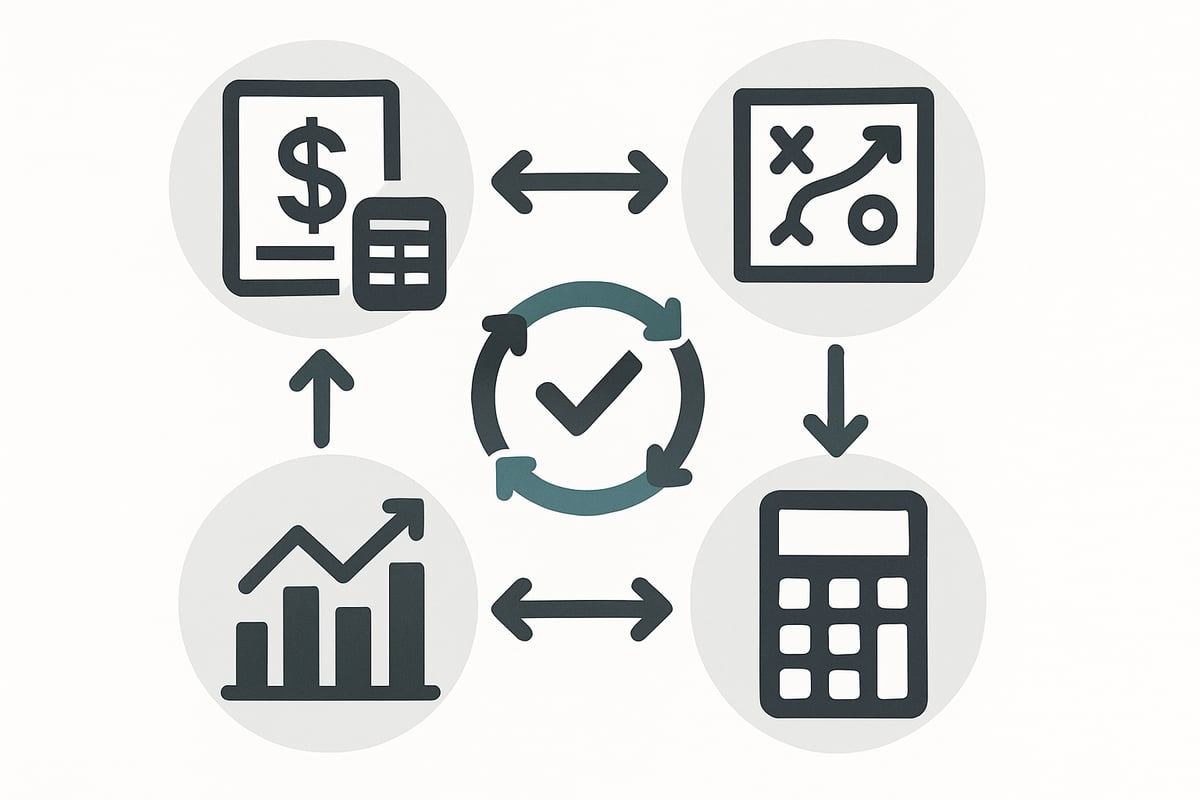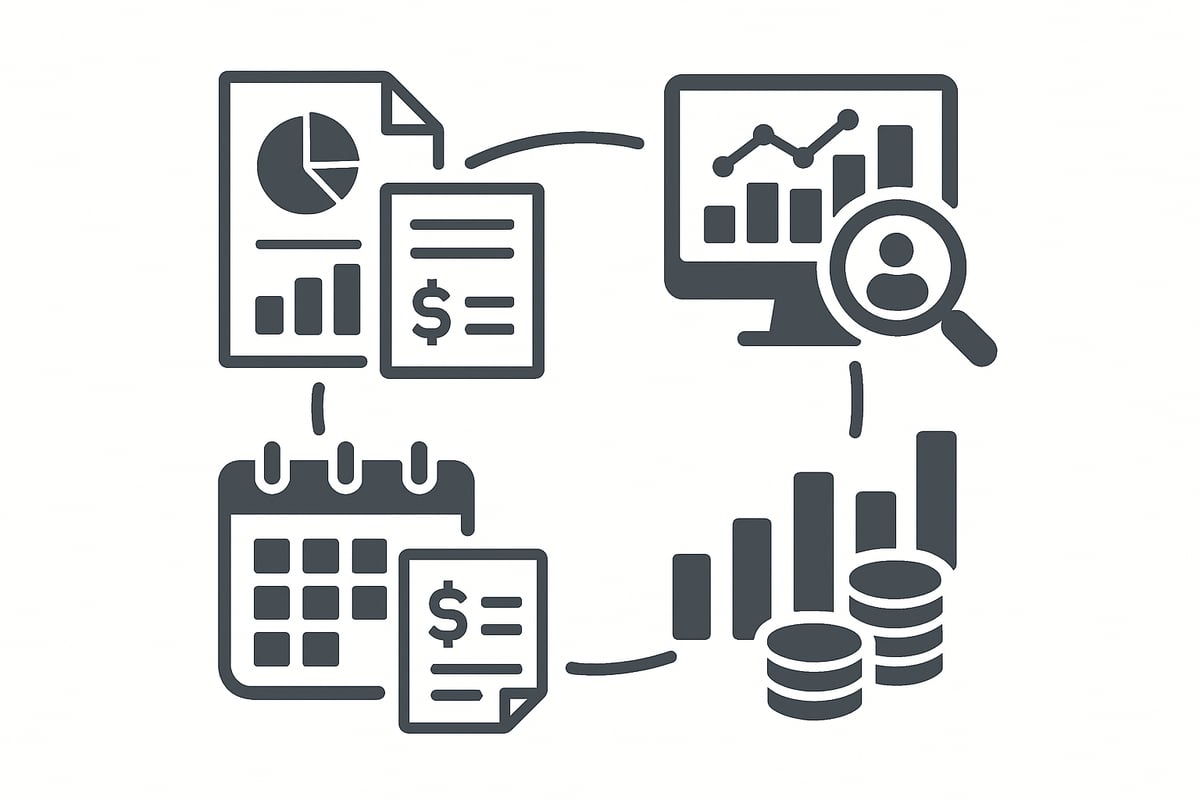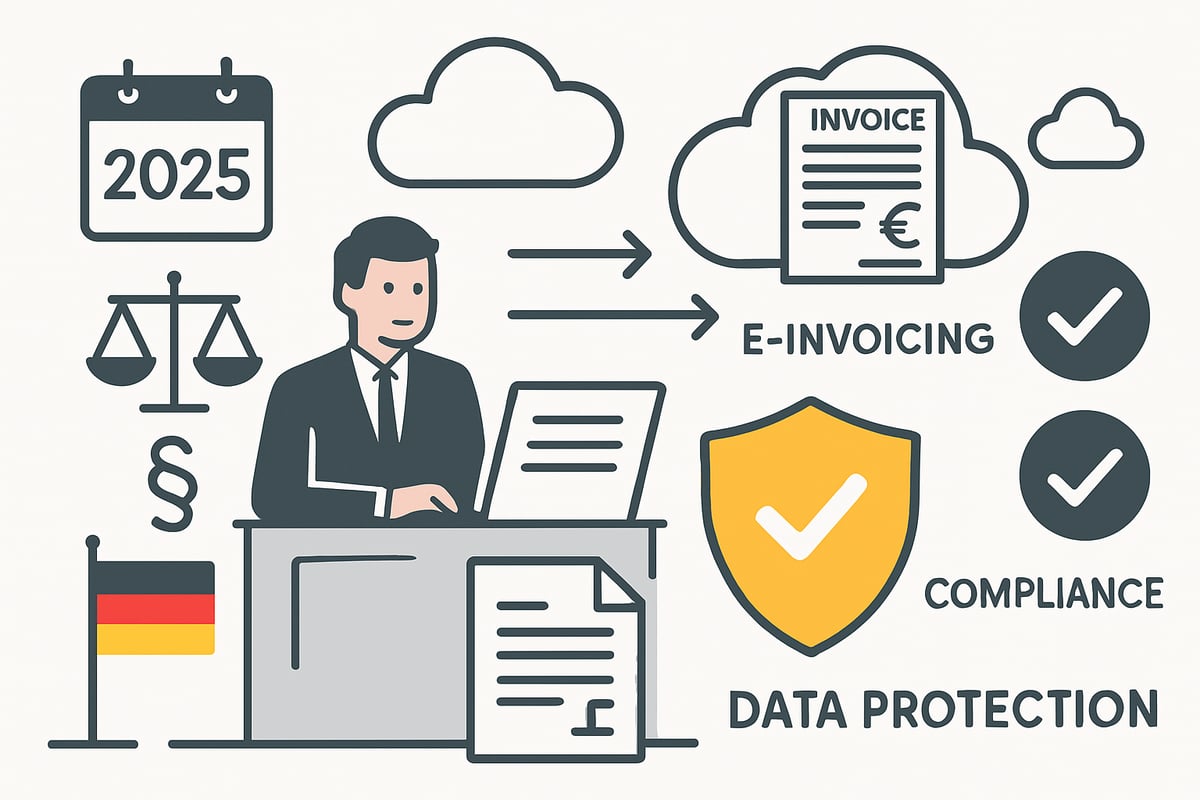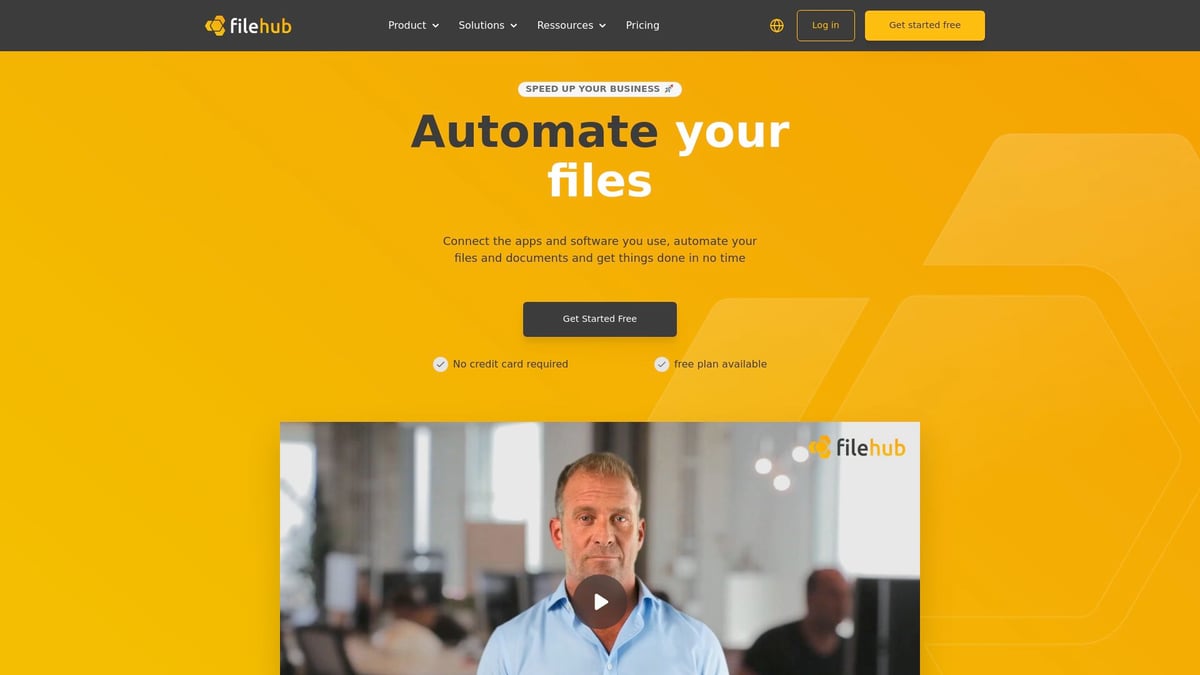Accounting in 2025 - Everything important at a glance

Accounting 2025 – what does that mean for you and your company? The demands on accounting are steadily increasing, driven by digitalization, new laws, and rising competitive pressure.
Right now, you need up-to-date information and practical strategies to make your accounting future-proof. Those who keep up here gain clear advantages.
In this guide, you'll learn everything important: from the basics and tasks to legal updates, digitalization trends, and concrete tips for 2025.
Whether you're a company, self-employed, or a professional – this article provides you with a compact, up-to-date guide to all things accounting.
What is accounting? Basics and significance
Accounting is the backbone of every entrepreneurial activity. It ensures that all financial and performance-related transactions are systematically recorded, monitored, and evaluated. Without functioning accounting, companies lack the basis for transparency, control, and sustainable success.

Definition and differentiation
Accounting is a central subfield of business administration. It encompasses all methods and processes for recording, monitoring, and evaluating cash and performance flows in the company. Terms like bookkeeping, controlling, and accounting are often used synonymously, but there are clear differences:
- Accounting describes the overall system for financial information processing.
- Bookkeeping is the part that records and documents all business transactions chronologically.
- Controlling uses the data from accounting to enable analyses and management decisions.
The objective is to create transparency about the financial situation, meet legal requirements, and provide a sound basis for decisions. Accounting must be distinguished from pure tax management (focus: tax optimization) and financial management (focus: raising and using capital). In everyday practice, accounting appears, for example, in the preparation of balance sheets, payment reconciliation, or budget planning. If you want to dive deeper into practical implementations, you'll find further inspiration under Solutions for finance.
Tasks of accounting
The tasks of accounting are diverse and go far beyond mere documentation. First, all business transactions must be recorded completely and traceably — keyword: documentation requirement. These data serve as the basis for providing information to internal and external stakeholders such as management, tax authorities, or banks.
Another key goal is the control and monitoring of business success. Accounting provides metrics for efficiency, profitability, and liquidity. On the basis of this information, companies can plan and manage their development in a targeted way. According to current statistics, over 90% of German companies consider accounting one of the most important core functions. It is therefore a key to strategic decisions and sustainable growth.
The four sub-areas of accounting at a glance
Accounting is divided into four main areas that work in an integrated way:
| Sub-area | Core task | Typical examples |
|---|---|---|
| External accounting | Representation of the financial position to the outside | Annual financial statements, tax balance sheet |
| Internal accounting | Internal planning, control, and management | Cost accounting, budget planning |
| Business statistics | Analysis and comparison of company data | Target-actual comparison, benchmarking |
| Planning and budgeting | Forward-looking financial planning | Annual budget, investment planning |
External accounting is aimed primarily at external partners, for example when preparing the annual financial statements. Internal accounting supports management through cost and performance accounting in steering processes. Business statistics analyze data and compare it with prior years or industry values. Planning and budgeting provide the financial view ahead and support investment decisions. In this way, accounting becomes an indispensable tool for all areas of the company.
The most important areas of accounting in detail
Accounting comprises various core areas that interlock and significantly influence business success. Each area has its own tasks, methods, and objectives — from external reporting to internal control and planning. The following gives you a detailed insight into the most important areas of modern accounting.

External accounting
External accounting portrays a company's financial situation to the outside. It is aimed at external stakeholders such as tax authorities, banks, investors, and the public. Core tasks include preparing the balance sheet, profit and loss statement, and cash flow statement. The legal foundations are based on the HGB, UGB, and international standards such as IFRS.
Typical tasks in external accounting are:
- Documenting all business transactions
- Preparing annual financial statements and tax balance sheets
- Accountability to authorities and partners
A large proportion of German companies regularly prepare external financial statements, underscoring the importance of this area. Digital solutions and automation in bookkeeping help make processes more efficient and less error-prone. This saves you time and helps you benefit from current legal developments.
Internal accounting (controlling)
Internal accounting supports corporate management in planning, control, and monitoring. The goal is to provide decision-making bases for optimizing processes and maximizing profit. The most important sub-areas are cost-type, cost-center, and cost-unit accounting as well as investment appraisal.
Tasks in internal accounting include:
- Analyzing and controlling efficiency
- Budget planning for departments and projects
- Carrying out target-actual comparisons and calculations
Methods such as forward-looking planning and the targeted use of key figures make internal accounting the heart of corporate management. This area is indispensable, especially when introducing new products or controlling cost structures.
Business statistics and comparative analysis
Business statistics and comparative analysis provide important data for analyzing and evaluating business success. The goal is to identify trends, detect deviations, and further develop accounting in a data-driven way.
Typical methods include:
- Company comparisons within the industry
- Time comparisons over several years
- Benchmarking against competitors
- Target-actual comparisons for performance control
With these tools, you can uncover improvement potential and make well-founded strategic decisions. Especially in the mid-market, this area of accounting is crucial to avoid falling behind the competition.
Planning and budgeting
Planning and budgeting form the foundation for future-proof corporate development. Here, financial goals are set, budgets are created, and forecasts for revenue, profit, and liquidity are developed. Accounting thus provides the basis for investment decisions and risk management.
Important tasks in planning:
- Creating and monitoring annual budgets
- Developing scenario analyses (e.g., "what if?")
- Rolling planning for greater flexibility
Through targeted budgeting and continuous monitoring, financial risks can be minimized and growth potential optimally leveraged. Modern tools support accounting in making planning processes efficient and transparent.
Legal foundations and updates in accounting 2025
The legal requirements in accounting are evolving rapidly. For companies, it is essential to understand and implement all updates for 2025. Only then will accounting remain compliant and future-proof.

Legal requirements and standards
Accounting is governed by numerous laws and standards. The focus is on the Commercial Code (HGB), the Company Code (UGB), and the GoB (Generally Accepted Accounting Principles). They define how business transactions are to be documented and measured.
Tax regulations such as the EÜR and accounting obligations affect primarily small and medium-sized enterprises. International standards like IFRS are gaining importance, especially for globally operating companies.
Adjustments are planned for 2025, for example regarding the digitalization mandate and e-invoicing. SMEs must review their accounting obligations and possibly introduce new systems. Compliance with these requirements ensures legal conformity in accounting.
| Area | Update 2025 |
|---|---|
| HGB/UGB | Adaptation to digital processes |
| E-invoice | Mandatory introduction for B2B |
| GoB/GoBD | Stricter digital archiving |
| IFRS | Expanded disclosure requirements |
Digitalization and mandatory e-invoicing
Starting in 2025, a major change in accounting is coming: mandatory e-invoicing will be introduced in Germany and the EU for B2B transactions. Companies will have to exchange and store invoices in electronic format.
Key points include the permitted formats, transition deadlines, and integration into existing systems. This will make accounting processes more efficient, transparent, and less error-prone.
The mandatory e-invoicing in Germany from 2025 affects all companies, regardless of size or industry. It offers opportunities for automation but also requires adjustments in document management.
Statistics show that more and more companies are digitalizing their invoicing processes. Those who act early gain advantages in accounting.
Data protection and GoBD compliance
With digitalization, the requirements for data protection and data security in accounting are increasing. The GDPR stipulates how personal data must be processed and stored. Violations can lead to heavy fines.
The GoBD regulate how books, records, and documents are to be kept and stored electronically. This concerns receipts, invoices, and all relevant documents in accounting. Particularly important: the complete traceability and immutability of all data.
Best practices include regular backups, encrypted data transmission, and clear access rights. Only then will accounting remain compliant and reliably protect sensitive information.
Practical examples and recommendations
How can the new regulations be implemented in accounting? Many SMEs have already introduced mandatory e-invoicing and benefit from more efficient processes. One example: the automatic processing of incoming invoices saves time and minimizes errors.
Important tips for accounting 2025:
- Check existing processes for digital gaps.
- Use checklists for legal requirements.
- Train your team regularly on updates.
- Rely on secure, certified software solutions.
Structured preparation ensures that accounting in 2025 remains compliant, digital, and efficient. That way, you're well set for the future.
Digitalization and automation in accounting
Digitalization is fundamentally changing accounting. More and more companies are relying on digital solutions to optimize processes and increase efficiency. Automation is not just a trend but a decisive success factor for competitiveness in 2025.
Those who invest early in modern systems can automate routine tasks, avoid errors, and respond more quickly to change. But which developments are especially relevant? And how can successful implementation in accounting be achieved?
Current trends and developments
In 2025, digital bookkeeping and cloud solutions dominate in accounting. More and more companies are digitalizing their document processing and relying on automated processes. Cloud-based bookkeeping enables location-independent work and makes collaboration between the team and tax advisor easier.
Another trend is integrating accounting software with other systems such as ERP or online banking. This way, data flows automatically to the right places and reduces manual effort. Tools like Lexware, DATEV, or SAP offer interfaces that enable end-to-end digitalization in accounting.
Automating routine tasks such as document capture or payment reconciliation saves time and reduces errors. Companies that leverage these developments create free capacity for strategic tasks and increase transparency.
Benefits of automation
Automation offers numerous advantages in accounting. One of the most important is enormous time savings, since recurring activities such as postings or document checks run automatically. As a result, costs fall and resources are used more efficiently.
Another advantage is the reduction of sources of error. Automated processes in accounting ensure consistent data and make it easier to comply with legal requirements. Evaluations are faster, enabling well-founded decisions.
Transparency and compliance also increase. All work steps are documented and traceable. This builds trust with partners, banks, and authorities and makes accounting fit for future requirements.
Challenges and approaches
The shift to digital and automated processes in accounting brings challenges. Many companies encounter acceptance issues within the team or underestimate the need for training. Interfaces between different systems can also cause difficulties.
A central topic remains data protection. Accounting processes sensitive data whose protection has the highest priority. Companies must implement IT security measures and consider GDPR requirements.
Approaches include targeted training, selecting compatible software solutions, and using cloud services with high security standards. This enables the smooth introduction of new systems in accounting.
Efficient document workflows with filehub
An innovative solution for automated workflows in accounting is offered by filehub. The platform enables you to automate document and file processes without programming knowledge. Companies can design invoicing processes, document management, and data transfer efficiently.

filehub can be connected to common accounting and ERP systems as well as web portals. Particularly valuable are GDPR compliance and high data security. Automation saves time, minimizes errors, and ensures smooth workflows in accounting.
What does that look like in practice? Invoices are automatically retrieved, checked, and forwarded to the responsible parties. If you want to learn more about these possibilities, you can automate efficient invoicing processes and discover hands-on examples.
Selecting and implementing accounting software
The right accounting software is a key factor for digitalization in accounting. Important criteria are scope of functions, security, interfaces, and ease of use. Compatibility with existing systems should also be checked.
For successful implementation, a step-by-step plan is recommended: needs analysis, selection of suitable software, testing phase, and employee training. Proven solutions like Lexware or DATEV offer extensive functions and support.
With a well-thought-out rollout, the transition goes smoothly. This makes accounting future-proof and flexible and keeps it a central success factor in the company.
Key terms and metrics in accounting
Accounting thrives on clear terms and meaningful metrics. If you know the most important definitions and metrics, you can manage processes safely and make sound decisions. Here you'll find a compact overview that gives you orientation and practical value.
Central terms explained simply
In accounting, you'll encounter many technical terms that you should master confidently. The basics include:
| Term | Briefly explained |
|---|---|
| Balance sheet | Comparison of assets and capital |
| Profit and loss statement (GuV) | Determining the company's performance |
| Cash flow statement | Overview of cash inflows and outflows |
| Cost type accounting | Analysis of cost types (e.g., materials, personnel) |
| Cost center accounting | Allocation of costs to departments |
| Cost unit accounting | Determining costs per product or order |
| Inventory | Detailed listing of all assets |
| Budget | Financial plan for a period |
| Benchmarking | Comparison with other companies or the industry |
| EÜR | Income-surplus statement for smaller businesses |
| GoB and GoBD | Generally accepted accounting principles and digital record-keeping |
These terms form the foundation of modern accounting. If you understand them, you'll stay up to date even with new developments like e-invoicing and digitalization.
Metrics and analyses for practice
Metrics are the steering instrument in accounting. They show how healthy and performant a company is. The most important metrics include:
- Liquidity: Shows whether all invoices can be paid on time.
- Profitability: Indicates how efficiently the capital employed is working.
- Equity ratio: Measures the company's financial stability.
- Debt ratio: Shows the ratio of debt to equity.
Regularly analyzing these metrics helps to identify risks early and take targeted countermeasures. Many mid-sized companies use specially developed tools to capture and evaluate metrics automatically. Modern technologies such as big data and AI are sustainably changing accounting, as the study Impact of Big Data on Accounting and Auditing impressively shows.
Tools and aids for accounting
Without digital support, accounting is hardly conceivable today. Helpful tools and templates greatly simplify analyses, reports, and day-to-day work.
- Digital checklists for month-end closing
- Cloud solutions for real-time data analysis
- Automation tools for document management and posting
- Templates for budget and liquidity planning
If you want to make accounting processes more efficient, the blog on process automation offers many practical solutions and tips for getting started with digital automation.
Support and best practices in accounting
In accounting, success is often determined by the right combination of external expertise, internal competence, and continuous optimization. Especially in 2025, companies face new challenges and opportunities. How can you ensure that your accounting remains efficient, compliant, and future-proof? The following best practices show what matters now.
Collaboration with tax advisors and external experts
Working with tax advisors and other specialists is particularly valuable in accounting. They provide up-to-date expertise, know the latest legal requirements, and support complex issues.
Typical advantages include:
- Support with annual financial statements and tax returns
- Advice on restructurings and special cases
- Review of compliance with all regulations
Small and medium-sized enterprises in particular benefit from a cost-benefit assessment: external experts provide security while conserving internal resources. Consider when an external advisor is worthwhile for your accounting and how you can benefit from their experience.
Independent organization and training
Strong accounting also comes from internal capabilities. Focus on targeted training: online courses, webinars, and professional literature help keep knowledge up to date. Organize regular team trainings to integrate new topics such as sustainability, digitalization, or current legislative changes.
Digital learning platforms and industry portals are ideal tools for efficiently expanding know-how in the field of accounting. Those who rely on initiative can adapt accounting flexibly to new requirements. Scientific studies, such as the integration of sustainability into accounting, show how important new skills and training are for future viability.
Process optimization and continuous improvement
Accounting is not a static area — processes must be regularly reviewed for efficiency and quality. Use checklists, audit tools, and benchmarks to identify weak points. Introducing quality standards and clear control mechanisms ensures transparency and reduces sources of error.
Leverage digitalization to automate routine tasks and save time. Innovative technologies such as blockchain or artificial intelligence are already changing accounting today. Those who consider current research, such as blockchain, AI, and machine learning in financial accounting, can further develop processes in a targeted way.
Tips for 2025: How to keep your accounting future-proof
2025 brings new trends, regulations, and opportunities for accounting. Stay informed about legislative changes, digitalization requirements, and new tools. Rely on automation, secure document storage, and regular training — that way you're prepared for the future.
Here's a compact checklist:
- Review current and upcoming regulations
- Digitalize and automate accounting processes
- Promote internal training on innovations
- Use best practices from successful companies as a model
With these measures, your accounting will remain robust and flexible in 2025 as well.
If you now want to make the next steps in accounting more efficient and future-proof, automation is a real game-changer. Especially with a view to new legal requirements and growing digitalization pressure, it's worth simplifying routines and minimizing sources of error. With a platform like filehub, you can easily automate recurring tasks, such as retrieving and processing invoices — without programming effort but with full control over your processes and data. Just give it a try and try filehub.one for free now.


